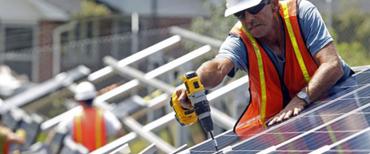
A pair of competing solar-energy initiatives seeking space on the 2016 ballot may cause confusion for voters.
But Sen. Jeff Brandes, R-St. Petersburg, is confident that won't be the case with a separate measure involving solar panels and energy-saving devices that he wants to put before voters.
"Mine is cut and dry," Brandes said. "We're going to cut taxes."
Brandes is spearheading a proposal (SJR 170 and SB 172 in the Senate and HJR 193 and HB 195 in the House) that, in part, would prohibit property appraisers from calculating into the assessed values of commercial properties any renewable energy devices that provide power to just those businesses.
With little opposition, the legislative proposal cleared its second House and second Senate committees Tuesday.
The proposal is an expansion of an already-existing law that applies to residential properties that use renewable-energy devices. Those devices can include solar energy collectors, storage tanks, pumps, fans and windmills.
If approved, the proposal is projected to save businesses about $17.2 million in 2017, with the number growing to $21.2 million by 2020.
"One of the purposes of this bill is to make sure that we promote renewable energy in the state of Florida," said Rep. Lori Berman, a Lantana Democrat who is helping sponsor the House version.
The proposal comes amid a clamor over two rival solar initiatives that are attracting much more attention and money.
A proposal by a group called Floridians for Solar Choice would, in part, allow businesses to generate and sell up to two megawatts of solar power to customers on the same or neighboring properties. In doing so, it would largely shield the solar producers from state and local regulations.
Meanwhile, a group called Consumers for Smart Solar wants to place into the state Constitution existing rules about individuals and businesses being able to own or lease solar equipment for their use and to sell excess power to utilities.
When asked about Brandes' bill, Susan Glickman, Florida director for the Southern Alliance for Clean Energy, said, "There is such strong support for solar, it will have a cumulative effective of harnessing all the support."
Brandes said while the two other proposals may "cancel each other out," he doesn't think his plan "gets hurt."
The Consumers for Smart Solar proposal was sent to the Florida Supreme Court last week for a review to determine whether its wording meets legal requirements.
The Supreme Court has already approved ballot language for the rival Floridians for Solar Choice initiative.
Both must still gather enough signatures to qualify for the ballot.
GAETZ: NO 'WILLING DANCE PARTNER' ON SALES TAX SWAP
A House proposal to revive the idea of cutting property taxes in exchange for a higher state sales tax isn't going to move forward next year.
House Finance & Tax Chairman Matt Gaetz said Tuesday he doesn't see time being spent in the 2016 session on the measure, which was brought up in his committee in October. He said the idea doesn't appear to have support from the Senate.
"As Speaker Corcoran reminds us, it takes two to tango and I don't know if we have a willing dance partner in the Senate," the Fort Walton Beach Republican said, referring to Rep. Richard Corcoran, who will become House speaker after the 2016 elections.
U.S. Sen. Marco Rubio, then the state House speaker, pursued a tax-swap idea in 2007. After Gaetz's committee discussed reviving the proposal, Senate President Andy Gardiner indicated he wasn't in support.
"Back in the House, there were one or two Republicans that voted against that proposal, and I was one of them," Gardiner, R-Orlando, said. "So, I think you know where I'm coming from."
If the state eliminated all property taxes, committee records indicate the state's sales tax would have to go from 6 percent to 12.72 percent to cover existing state, local, school and special district expenses.
Other options looked at were to create a "super" tax exemption on the first $1 million of any property's appraised value, which would cover 98 percent of all residential and business properties in the state, pushing up the sales tax by 4.93 percentage points.
TWEET OF THE WEEK: "What a surprise. 'Florida Polytechnic aims to name campus after powerful former state senator.' " --- Pasco County Tax Collector and former state lawmaker Mike Fasano (@fasanomike) on the announcement Wednesday that Florida Polytechnic University will name its campus after former Senate Budget Chairman JD Alexander.


